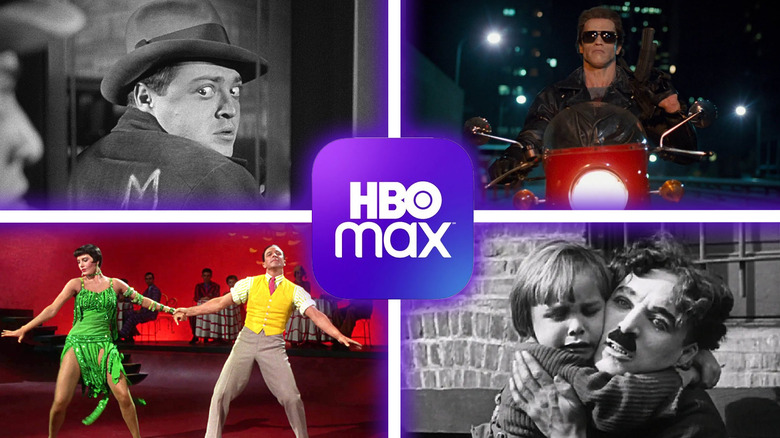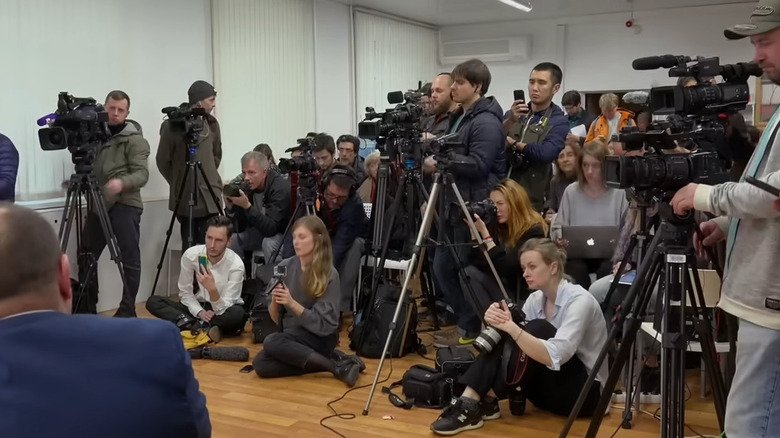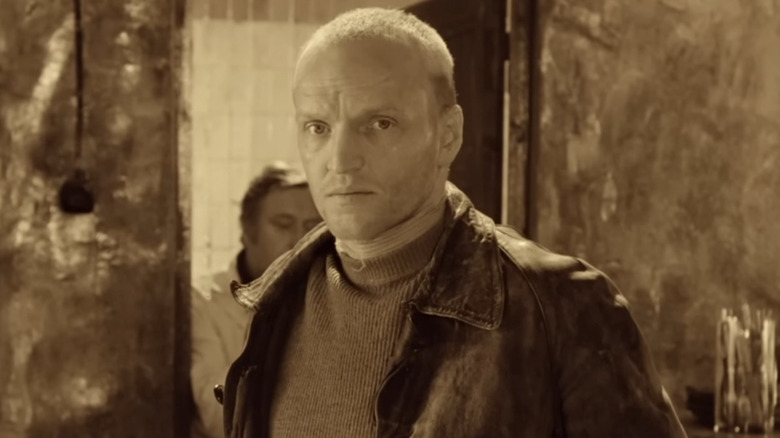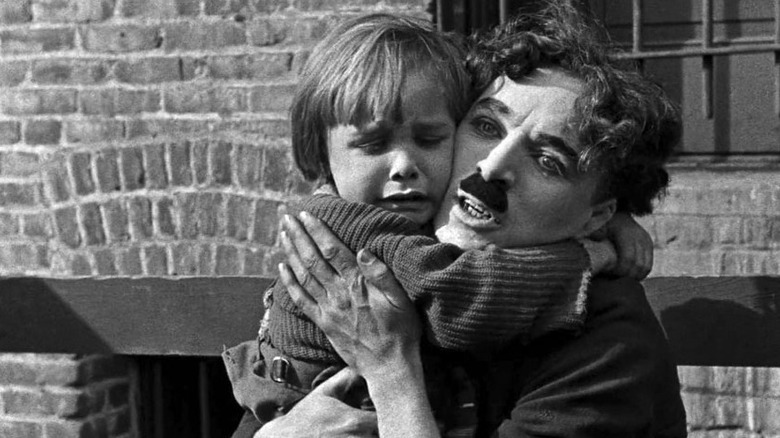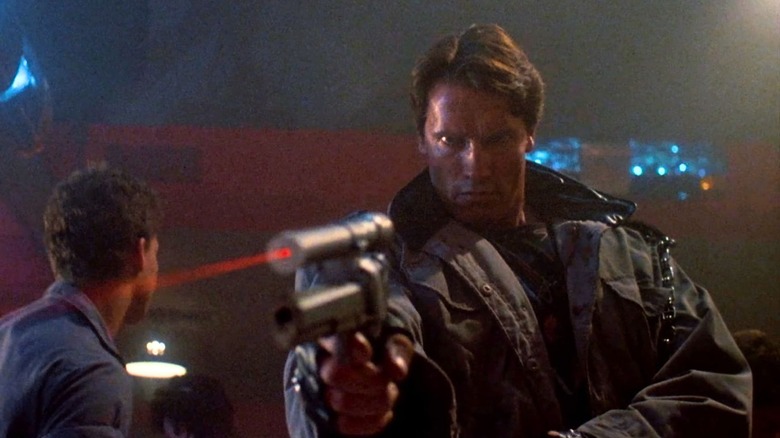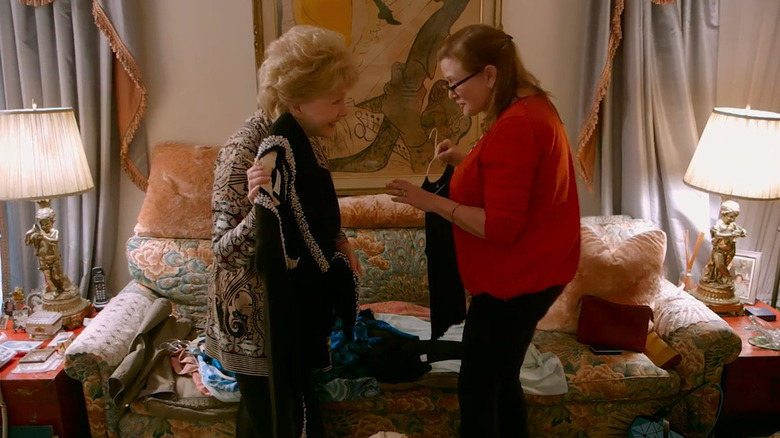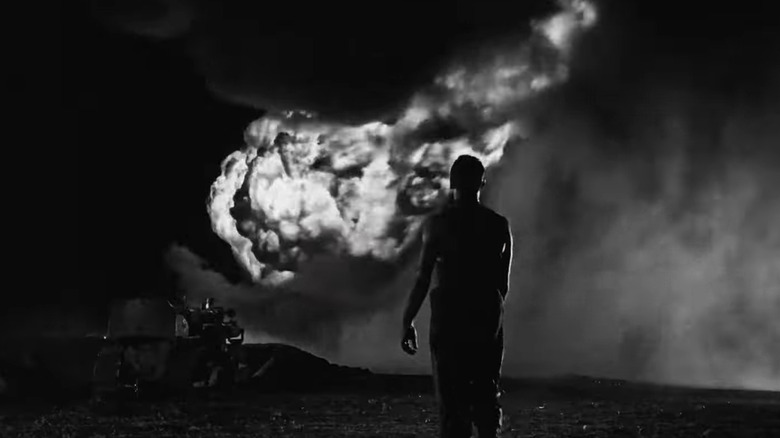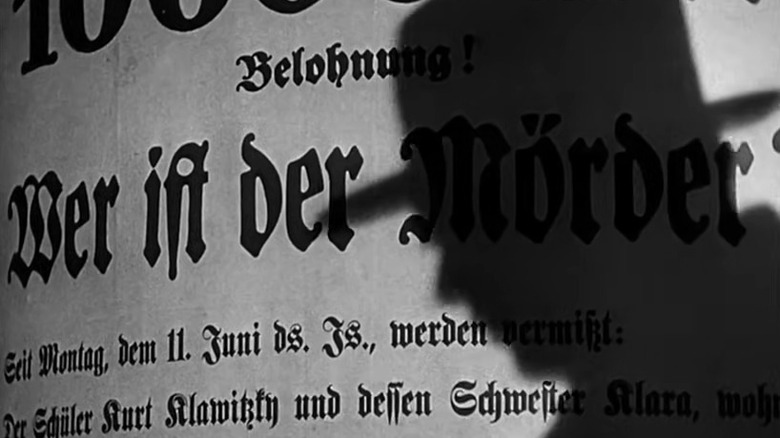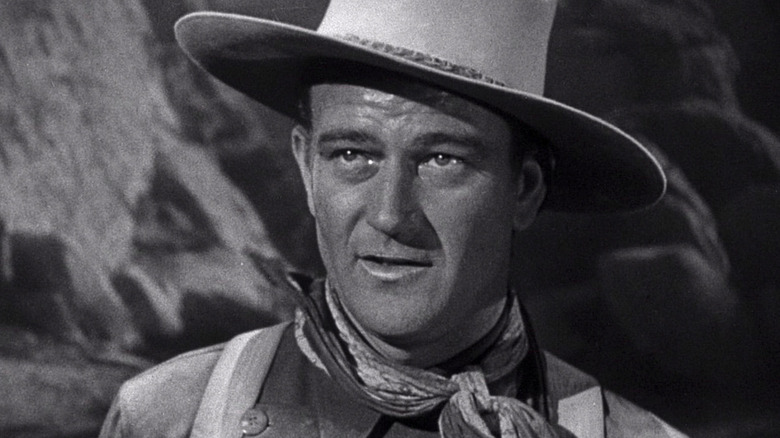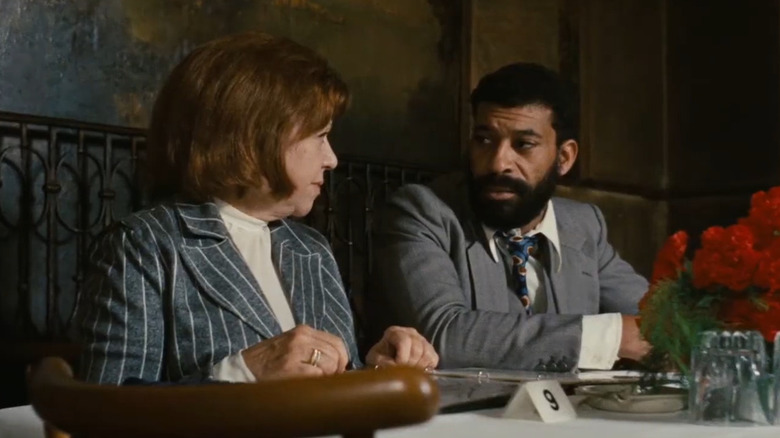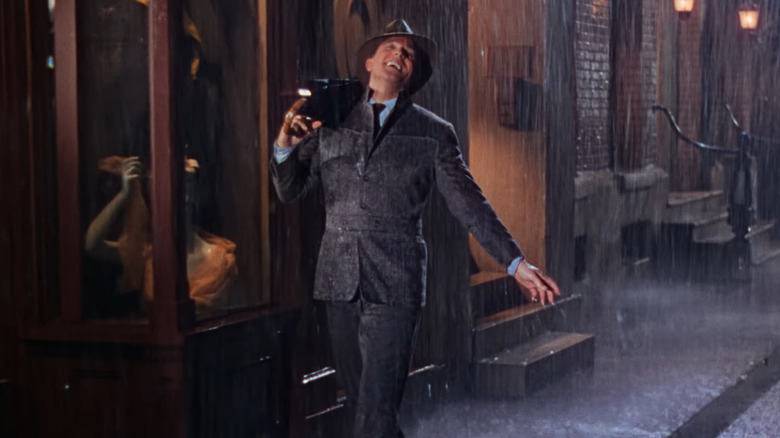10 Best Movies On HBO Max, According To Rotten Tomatoes
Rotten Tomatoes has something of a mixed reputation. Champions of the longstanding online review aggregator argue it has provided a once unimaginable service to consumers trying to navigate a cinema landscape more crowded than anyone could've have ever predicted it would be, all while allowing films that would otherwise be overlooked due to marketing, budget, and/or lack of star-power/IP-recognition pierce through the noise with flashy high scores. Critics, on the other hand, take umbrage with the confusing nature of its rating system, its uncomfortable ownership by Warner Bros. Discovery and, to a larger extent, Comcast (the parent company of NBC Universal), and the culture of — as Martin Scorsese put it — unadventurous consumerism it stokes in the wider filmgoing public.
Whatever side of the line you find yourself on, it can't be ignored that Rotten Tomatoes remains a largely trusted evaluator of a film's popular appeal — and, to its credit, those films that have impressively maintained 100% Certified Fresh ratings are far more often than not deserving of the hype. HBO Max is currently streaming several of these very films, which we have ranked according to their average 10-point-scale critical rating. The top 10 best movies on the streamer according to Rotten Tomatoes are indeed 10 of the best films ever made, ranging from contemporary documentaries to classic narrative features of all genres from around the world.
Here are the best movies on HBO Max, according to Rotten Tomatoes.
Welcome to Chechnya
Primarily an investigative journalist and author, David France has turned his fearless and relentless pursuit of truth into riveting, cinematic dramas several times now, with his documentary features focusing on the existential struggles faced by the LGBTQ+ community throughout time and across the globe. The American filmmaker made his directorial debut in 2012 with "How to Survive a Plague," which chronicled the gay activists who fought to have their humanity recognized while they suffered through the then-growing HIV/AIDS epidemic in the 1980s. Five years later, he helmed "The Death and Life of Marsha P. Johnson," a documentary following the life of the legendary activist.
Both films are necessary, eye-opening works of cinema that readers should seek out, but "Welcome to Chechnya" is somehow even more harrowing, courageous, and urgent. Distributed in-house by HBO Films themselves, "Welcome to Chechnya" uses hidden cameras and guerrilla filmmaking techniques to follow a group of Russian activists as they put their lives on the line to help LGBTQ+ individuals escape deadly persecution in Chechnya. Throughout the film, France, his team, and the activists themselves capture footage of real rescues, obscuring the identities of those involved with the use of deepfake technology.
"Welcome to Chechnya" was one of the most acclaimed documentaries of the year upon its release, earning nods from the Sundance Film Festival and the 73rd Primetime Emmy Awards in their documentary feature categories (it lost at both ceremonies, to the youth civic engagement doc "Boys State" and the Chinese-American COVID-19 doc "76 Hours," respectively). Equal parts thrilling, devastating, and even triumphant, it's a watch that will leave any viewer absolutely breathless.
Stalker
If you're a regular /Film reader, we'll bet you've heard the name Andrei Tarkovsky at least once in your life. The Soviet filmmaker maintains a mythic status among cinephiles, and rightly so, as his filmography contains some of the most audacious and provocative works of cinema to be made during his lifetime. For those among you who have felt daunted by the idea of breaking into his work, his 1979 science fiction feature "Stalker" is all at once accessible, exemplary of his singular brilliance, and a deeply engaging watch.
The titular "Stalker" of the film (Alexander Kaidanovsky) is more of a courier of people, bearing a title bestowed upon a talented few with the skill to make their way across a dangerous and desolate paranormal wasteland referred to as "The Zone." Stalkers are handsomely paid to escort clients to a sacred room wherein people are said to be granted whatever they wish for. On this particular pilgrimage, our hero is accompanied by an empathetic, thoughtful writer (Anatoly Solonitsyn) and a professor, whose reserved, intellectual personality keeps his true intentions safe from prying minds.
It's a slow journey indeed, a far cry from the noisy sci-fi fare readers may be more accustomed to. In place of constant action, however, are psychologically thrilling examinations of desire, ambition, and selflessness, set within an increasingly tense and foreboding atmosphere that unsettles the viewer more and more with every near-brush with death. "Stalker" is remembered as one of the greatest and most influential science fiction films ever made, perhaps most notably paving the way for Alex Garland's beloved 2018 feature "Annihilation."
The Kid
Speaking of legendary figures of cinema, few filmmakers are as influential or iconic as Charlie Chaplin. A giant of the silent film age who was accomplished as a director, producer, writer, and bona fide movie star, his legacy is filled with groundbreaking performances and technical achievements which helped push the movie business forward during its foundational years. Many readers likely have yet to engage directly with Chaplin's work (though they might have seen Robert Downey Jr.'s memorable performance in the eponymous 1992 biopic), as silent films aren't exactly the most obviously exhilarating options on a streaming service that boasts a comprehensive catalogue of contemporary blockbusters you already struggle to make time for. Even so, we strongly implore HBO Max subscribers to give "The Kid" a chance.
One of three perfect Charlie Chaplin films (according to Rotten Tomatoes), this heartfelt 1921 comedy is quintessential Chaplin, a perfect entry point for any reader wanting to experience a master of cinema in his natural element. Adopting his recognizable Tramp persona, he plays a street vagabond who rescues a child abandoned by his mother. They develop a close relationship, with the Tramp teaching the child how to survive life on the street by means of con artistry, leading to many elaborately staged hijinks that are bewildering even by today's stunt standards. "The Kid" is an effective feature that deserves the reputation that precedes it, as well as one that should leave viewers satisfied even if they choose not to delve further into the world of silent film.
The Terminator
The best reviewed films on HBO Max aren't all artsy classics and documentaries — though, over 40 years now since it obliterated box office expectations, James Cameron's "The Terminator" might be pretty close to the former category. A masterpiece of science fiction storytelling that effectively minted the careers of both Cameron (then a newcomer with only "Pirhana II: The Spawning" under his belt) and star Arnold Schwarzenegger (then best known for the documentary "Pumping Iron" and the blockbuster "Conan the Barbarian"), the 1984 film grossed over four times its budget and successfully launched a decades-spanning franchise that has included six films (the most recent of which was released in 2019), numerous comics and video games, and two television shows.
Schwarzenegger stars as the titular Terminator, a lifelike, semi-sentient robot soldier from the future sent back in time to 1984 by an advanced artificial intelligence that has managed to all but take over humanity. His mission — assassinate Sarah Connor (Linda Hamilton), a normal woman of no apparent significance who will nonetheless give birth to the future leader of the human resistance. Standing in his way is Kyle Reese (Michael Biehn), a member of the resistance sent back in time by Sarah's future son to protect her.
As of March 2024, "The Terminator" and "Stalker" were the only two sci-fi movies with perfect Rotten Tomatoes scores. While it may not top our personal ranking of the entire "Terminator" film series, there's no question that the original model is an unmitigated masterpiece.
Bright Lights: Starring Carrie Fisher and Debbie Reynolds
Produced in-house by HBO Films, "Bright Lights: Starring Carrie Fisher and Debbie Reynolds" is a remarkably intimate look into the relationship between one of the entertainment industry's most beloved mother-daughter duos. The documentary is, of course, quite bittersweet and at times tragic, as it was unknowingly filmed during the months leading up to the deaths of both Fisher and Reynolds in 2016. Fisher, 60 years old at the time, passed away on December 27, reportedly due to a drug overdose. The "Star Wars" actor had lived with a narcotics addiction disorder for decades, as well as manic-depressive disorder, the latter of which is a topic Fisher and Reynolds discuss in "Bright Lights." The day after Fisher's passing, Reynolds died of a stroke at the age of 84.
During this quietly precious period in their lives together (the pair were as close as a mother and daughter could be, even living next door to one another). With Fisher headed into production on "Star Wars: The Last Jedi" while trying to take care of her aging yet vibrant mother, the two candidly discuss Reynolds' declining health, the reality of growing up in a home so immersed in the entertainment industry, and how their relationship had grown stronger even — or perhaps especially — as they confronted their individual struggles. Though it was released just 10 days after Reynolds' passing, "Bright Lights" is an honest yet joyful celebration of two strong women who were made even stronger through their love for one another.
If you or someone you know needs help with mental health, please contact the Crisis Text Line by texting HOME to 741741, call the National Alliance on Mental Illness helpline at 1-800-950-NAMI (6264), or visit the National Institute of Mental Health website.
If you or anyone you know needs help with addiction issues, help is available. Visit the Substance Abuse and Mental Health Services Administration website or contact SAMHSA's National Helpline at 1-800-662-HELP (4357).
The Wages of Fear
Based on the 1950 Georges Arnaud novel of the same name, "The Wages of Fear" is an awe-inspiring achievement of technical filmmaking, editing, and narrative structure. The extraordinary attention paid to such basic and foundational aspects of the craft allow French writer-director Henri-Georges Clouzot to turn a relatively simple story into an unbelievably pulse-pounding thriller that exceeds expectations even by today's inflated blockbuster standards. The film follows four men stranded by poverty in a small Puerto Rican town completely dominated by an American oil company. With no other opportunities for employment, they agree to take on a truck-driving job for the company, transporting dangerous explosive chemicals that could combust with a single sharp turn or pot hole. The film is known both for the air of suspense it maintains throughout its runtime and the brutally unforgiving nature of its plot, which holds its characters without mercy to the deadly reality in which they live.
Netflix revived the story of "The Wages of Fear" in 2024 for a modern audience (critics were overwhelmingly negative in their reactions to the film Julien Leclercq made for the streamer), though it was actually the third attempt at a remake since the first film's release. Warner Bros. produced an American remake in 1958 titled "Violent Road," which followed six men transporting volatile rocket fuel through the mountains and has since been largely forgotten. William Friedkin adapted the same Arnaud novel for his 1977 film "The Sorcerer," which has at least enjoyed significant cultural reevaluation in recent years despite how abysmally it performed at the box office. Overall, no successor to "The Wages of Fear" has managed to capture the spectacular tension of the film's pacing and perfectly executed action set pieces.
M
The only film on this list that could possibly be considered more suspenseful than "The Wages of Fear" is Fritz Lang's genre-defining noir masterwork "M." The groundbreaking German filmmaker is well-known for his earlier work, "Metropolis," which itself helped to establish and inspire the look of modern science fiction films. With "M," however, we'd argue Lang achieves an even more prescient feat of storytelling by tapping into a then-untouched fascination with serial killers in a way that modern filmmakers still aspire to perfect. He didn't just plop a vicious, animalistic villain in his story like a force of nature or cinematic curio, but made his murderer a human being that the audience can psychologically understand.
Peter Lorre ("The Man Who Knew Too Much," "Casablanca," "Mad Love") gives a breakthrough performance as Hans Beckert, a tortured and dangerously mentally ill man who feels uncontrollable compulsions to kill little children. His spree is so prolific that his town has effectively gone on lockdown until the local police are able to apprehend him, as he has promised to continue stalking and murdering his prey for as long as he remains free. It's a startlingly unflinching exploration of how a man of extremely aberrant psychology might exist in society — as well as how that society might react in its own violent ways.
"M" pioneers many technical filmmaking elements we now take for granted, most notably through its use of sound, shadow, and music. It's far from a mere museum piece, however, with a story that's just as chilling as it is thought-provoking.
Stagecoach
It's hard to tally all the films we might not have gotten to see had 1939's "Stagecoach" never been made. The seminal John Ford feature inarguably deserves a lion's share of the credit for establishing the western as a respectable genre in prestige filmmaking, as well as inspiring and directly influencing a wide array of filmmakers. Those inspired by the film include everyone from Orson Welles (who obsessively screened the film with technical advisors to understand how each shot was accomplished prior to helming his own 1941 directorial debut "Citizen Kane") to Martin Scorsese, the latter of whom drew less inspiration from the film itself than the tumultuous partnership that carried it improbably over the finish line.
For above all its contributions to cinema, "Stagecoach" most notably saw Ford shockingly thrust then-second-string actor John Wayne into his first starring role. The move was so unconventional that it caused Ford to part ways with producer David O. Selznick, throwing the film's funding into jeopardy. When they were finally able to get production underway (though, not without significant headache for the studio, who were horrified to learn that Ford had Wayne doing his own stunts), Ford and Wayne proved to be a volatile on-set "team," mainly because Ford had elected to bully Wayne into becoming the leading man he thought he could be. The abuse resulted in a near mutiny against Ford, with Wayne rallying the cast and crew behind him.
The end result was an exhilarating ensemble western anchored by a star-making performance from Wayne as an outlaw, on the run and on a righteous quest for vengeance. It may not have won Best Picture that year at the Oscars (Selznick made out all right on that front, electing to produce "Gone with the Wind" instead), but it laid the groundwork for the western genre to carry the motion picture business into a new era.
Ali: Fear Eats the Soul
Many films discussed on this list already will give the viewer a certain kind of heartbreak, but none render a romance as vividly or as surprisingly as Rainer Werner Fassbinder's German film "Ali: Fear Eats the Soul." Released in 1974 (and set just two years earlier, during the aftermath of the Munich Olympics massacre which intensified anti-Arab racism especially in Germany), it follows Emmi (Brigitte Mira), an elderly, lonely German widow who falls in love with Ali (El Hedi ben Salem), a Moroccan immigrant half her age.
Their love for one another, though genuine and mutually felt, causes those in their respective communities to expose their own prejudices, especially Emmi's adult children who make derisive remarks about Ali's skin color, culture, age, and motives. Far from an exercise in portraying a white woman experiencing racism for the first time, however, Fassbinder strives to explore the kind of love that's able to push past such constant exterior pressure — and, tragically (yet with courageous humanity), how that same love might be corrupted once the pressure finally breaks through.
It's a gorgeously shot film with themes that challenge the viewer in ways they may not expect, even knowing the subject matter going in. Whether or not one feels Fassbinder's depiction of race and romance holds up fifty years on, there's no denying that Mira and Salem's distinct and understated performances make "Ali: Fear Eats the Soul" a necessary watch for any lover of cinema.
Singin' in the Rain
While "Bright Lights" allows viewers to look back on Debbie Reynolds' unbelievable life in the entertainment industry, they would be best served by going back themselves to the moment she broke through to stardom in "Singin' in the Rain." Reynolds was just a teenager when she starred in the film as Kathy Selden, a chorus girl who attracts the attention of stunt-performer-turned-filmmaker and silent movie star Don Lockwood (co-director Gene Kelly) just as the curtain is rising on the era of "talking pictures." Realizing that his next film will be swiftly dismissed after the recent success of a talkie, Don teams up with Kathy and his best friend Cosmo (Donald O'Connor) to turn their troubled swashbuckling melodrama into a blockbuster musical.
Making "Singin' in the Rain" was seemingly more difficult than making "The Dueling Cavalier," with all three stars being put through the wringer during the production process. O'Connor was famously hospitalized after shooting the athletically astounding solo dance number "Make 'Em Laugh," which is still one of, if not the most iconic and impressive musical numbers in cinema history). Nevertheless, the end result is an undisputed triumph of filmmaking that stands head and shoulders above most modern films of any genre, and charmed plenty of critics throughout the decades as well.
As of December 2024, it was one of only six musicals with a perfect 100% score on Rotten Tomatoes, and one of only two with a rare near-perfect score on their rival Metacritic. According to the former review aggregator as of writing, it is the best film currently streaming on HBO Max — and when a film makes you feel as glorious as "Singin' in the Rain," it's hard to disagree.
